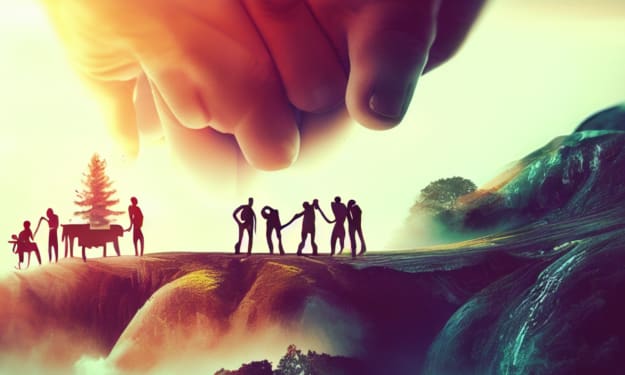The Melody of Silence: A World Without Words
Discovering the Power of Music in a Voiceless Society

Silence can be a powerful thing. It can convey meaning and evoke emotion without the need for words. But what happens when a society is devoid of words altogether? How can people connect and communicate in a world without language?
This is the reality for some individuals with conditions like nonverbal autism, cerebral palsy, and other disabilities that impact speech and communication. In these cases, music can become a powerful tool for connection, expression, and healing.
Music has the unique ability to transcend language and cultural barriers. It can evoke emotions, trigger memories, and create a sense of community. In a world without words, music can take on even greater significance. It can provide a means of communication and self-expression that may be otherwise impossible.
For individuals with nonverbal autism, for example, music therapy has been shown to improve social and communication skills, increase attention span, and reduce anxiety. In a study published in the Journal of Autism and Developmental Disorders, researchers found that children with autism who received music therapy showed significant improvement in social communication skills compared to those who received standard care.
Similarly, music therapy has been used with individuals with cerebral palsy to improve movement and coordination, as well as communication skills. In a study published in the Journal of Music Therapy, researchers found that music therapy interventions improved communication skills in individuals with cerebral palsy, particularly in the areas of initiating and responding to communication.
But music's power goes beyond its therapeutic benefits. In a world without words, music can provide a sense of community and belonging. For individuals with disabilities that impact communication, it can be isolating and lonely. Music can provide a sense of connection and shared experience.
One organization that recognizes the power of music in a voiceless society is the non-profit group "Music & Memory." Founded in 2010, Music & Memory provides personalized music therapy for individuals with Alzheimer's, dementia, and other cognitive and physical disabilities. The organization has seen tremendous success in improving quality of life for its clients, including reduced anxiety and agitation, increased socialization, and improved mood.
Music & Memory also provides training and resources for caregivers and healthcare professionals, recognizing the importance of music in improving the lives of individuals with cognitive and physical disabilities.
In a world that often values words and language above all else, the power of music in a voiceless society cannot be understated. It provides a means of communication, self-expression, and community for individuals with disabilities that may otherwise be isolated and marginalized.
Music can also be a tool for emotional expression and processing. In a study published in the Journal of Music Therapy, researchers found that music therapy helped children with emotional and behavioral disorders to better regulate their emotions and behaviors, as well as to express themselves in a more positive way.
Furthermore, music has been shown to have physical benefits as well. In a study published in the Journal of Advanced Nursing, researchers found that listening to music can reduce pain and anxiety in patients undergoing surgery.
Music can also help to create a sense of identity and purpose. For individuals with disabilities that impact communication, it can be challenging to develop a sense of self and to find activities that provide a sense of purpose. Music can provide a means of self-expression and creativity that may be otherwise difficult to achieve.
In addition to its therapeutic benefits, music can also be a source of joy and celebration. In a world without words, music can still provide a means of celebrating milestones and special occasions. In fact, music has been an integral part of human celebration and ritual for thousands of years. From weddings to funerals, from religious ceremonies to cultural festivals, music has played a vital role in human expression and connection.
Music can also be a means of preserving cultural heritage and promoting diversity. In a world where language and cultural barriers can be divisive, music can provide a common ground for people to connect and celebrate their differences. It can be a means of preserving traditional music and promoting new forms of cultural expression.
In conclusion, the power of music in a voiceless society cannot be overstated. For individuals with disabilities that impact communication, music can provide a means of connection, expression, and healing. It can be a tool for emotional and physical well-being, as well as a source of joy and celebration. Organizations like Music & Memory are recognizing the importance of music in improving the lives of individuals with cognitive and physical disabilities, and more research is being done to explore the therapeutic benefits of music.
In a world that often values words and language above all else, we must remember the power of music to connect us and provide a sense of community and belonging. As we continue to navigate the complexities of a rapidly changing world, we must not forget the melody of silence, and the power of music to bridge the gaps that words alone cannot fill.






Comments
There are no comments for this story
Be the first to respond and start the conversation.